The program PYCON RUSSIA is ready: 25 reports from speakers from Disney, Facebook, Spotify, PyPy, Tinkoff Bank, Yandex
A little less than a month to the fifth Russian PyConRu . The conference will be held on July 16-17 at the Cronwell Yakhonty Tarusa hotel, 95 km from Moscow (there will be a transfer to the venue and back).
The program is now 25 reports. Here are some of the speakers: Paul Hildebrandt (Walt Disney Animation Studios, USA), Łukasz Langa (Facebook, USA), Nina Zakharenko (Venmo, USA), Lynn Root (Spotify, USA), Maciej Fijałkowski (PyPy, South Africa), Andrei Stepanov (Tinkoff Bank), Alexander Koshkin (Positive Technologies), Kirill Borisov (Yandex), Elizaveta Shashkova (JetBrains), Mikhail Yumatov (TsIAN), Igor Novikov (Scalr), Oleg Churkin (Rambler & Co).
Until June 30, a ticket costs 15 500 rubles. Then the cost rises. It's time to look at the program and register if you put it off. Under the cut in short all the reports of the conference.
')

 Inside the Hat: Python @ Walt Disney Animation Studios
Inside the Hat: Python @ Walt Disney Animation Studios
Paul Hildebrandt, Walt Disney Animation Studios, Los Angeles, USA
The first headliner is a senior engineer at Walt Disney Animation Studios, Paul Hildebrandt. Paul leads the team responsible for developing a media asset management system, a media player, a review system of current film material with a mobile interface and other similar tools. Among the cartoons he worked on are “Cold Heart”, “Rapunzel”, “Ralph”, “City of Heroes”, “Volt” and others.
At the conference, Paul will talk about how Disney uses Python to create animated films.
 Gradual Typing of Production Applications
Gradual Typing of Production Applications
Łukasz Langa, Facebook, California, USA
Python ore developer since 2010, Facebook developer, “chronic perfectionist, pianist, dad” Łukasz Langa will speak on “Gradual Typing of Production Applications”.
 Why is Python slow?
Why is Python slow?
Maciej Fijałkowski, Baroque Software, South Africa, Cape Town
Maciej for the last few years has been working mainly on PyPy, participated in programming all parts of the code base, including JIT and GC. Also, Maciej is the main developer of jitviewer, a tool for analyzing the performance of python programs under PyPy. Maciej will give a talk “Why is Python slow?”
 Elegant Solutions for Everyday Python Problems
Elegant Solutions for Everyday Python Problems
Nina Zakharenko, Venmo, Portland, USA
Developer at Venmo, earlier at Reddit and HBO, Nina Zakharenko will talk about common anti-patterns in python programs and show practical python solutions for improving your code with tools such as Decorators, Context Managers, Mixins and Lambdas.
 Tales of Tunes on Tubes: Python in Spotify's Infrastructure
Tales of Tunes on Tubes: Python in Spotify's Infrastructure
Lynn Root, Spotify, USA, New York
The engineer in Spotify, a member of PSF and DSF, the leader of PyLadies, the founder and former leader of San Francisco PyLadies Lynn Root will tell how python is used in the main music streaming service in the world of Spotify, and how they move from 2.7 to 3.6.
 Master Class "Speech Recognition in Python without PhD"
Master Class "Speech Recognition in Python without PhD"
Andrey Stepanov, Tinkoff Bank, Moscow
Developer Analyst Andrei Stepanov from Tinkoff Bank will talk at a master class on how to write and train your simple speech recognition engine with Tensorflow and neural networks as soon as possible.
 Python on the razor's edge: PyPy project
Python on the razor's edge: PyPy project
Alexander Koshkin, Positive Technologies, St. Petersburg
The performance of the PyPy interpreter is achieved through specialization, as elsewhere. Alexander Koshkin, Senior Python developer at Positive Technologies, will tell you what exactly this means and how RPython allows you to build fast interpreters of arbitrary languages.
 Debugging in Python 3.6: Faster, Higher, Stronger
Debugging in Python 3.6: Faster, Higher, Stronger
Elizaveta Shashkova, JetBrains, St. Petersburg
Elizabeth will tell you how the new interface for computing frames in Python 3.6 works, how it can help you create a quick debugger, and why such a quick debugger could not be created in previous versions of Python. For those who have not yet made the final decision about switching to Python 3.6, this report will provide several additional reasons why this is worth doing.
 Scrapy internals
Scrapy internals
Alexander Sibiryakov, Scrapinghub, Czech Republic, Prague
Scrapy is a good example of a modern asynchronous application. Moreover, it combines in itself every functional: Item pipelines, HTML / CSS selectors, Middleware, support for several network protocols, stop / continue from the moment of stopping, and many others. Alexander will tell you how data processing looks from inside Scrapy, the architecture of the queue of the content loading module and other components necessary for its debugging: Scrapy shell, telnet console, memory consumption debugger.
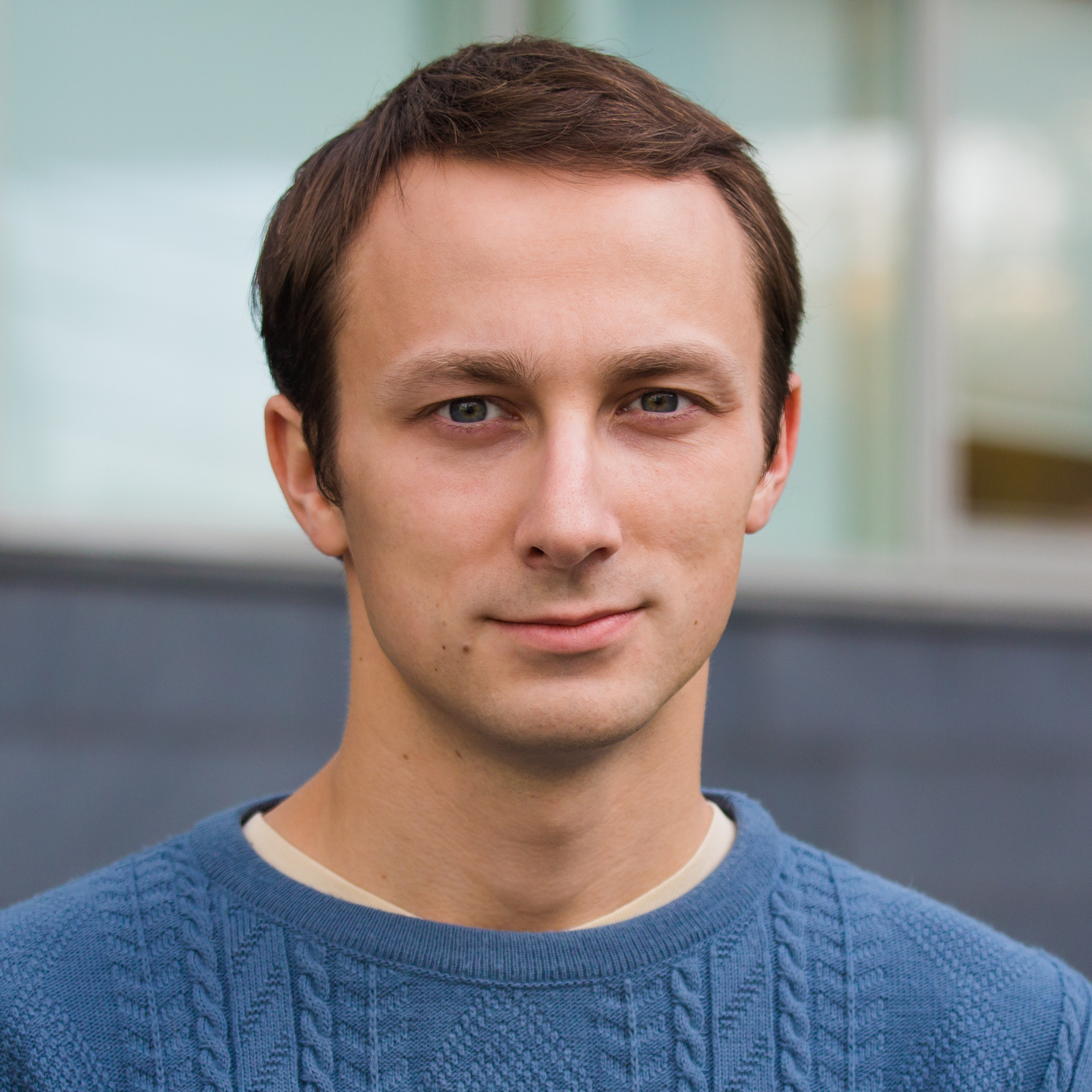 Python of Things
Python of Things
Kirill Borisov, Yandex, Moscow
The permanent speaker of PyCon Russia, Kirill Borisov, will examine in the report the place of Python in the IoT world, how to use it in communication with various pieces of iron and on what it is launched for the sake of great justice.
 What can Python on microcontrollers
What can Python on microcontrollers
Andrei Vlasov, JetBrains, St. Petersburg
In 2014, MicroPython appeared - a Python implementation for microcontrollers. How did you manage to get Python to work on something with only 16 kilobytes of memory? Did you have to cut the language hard for this? (spoiler: no!) What interesting things can be done with glands and MicroPython? Different sensors, accelerometers, LEDs, motors - that's all in the report of Andrew.
 Total performance control
Total performance control
Mikhail Yumatov, TSIAN, Moscow
Mikhail will tell you what tools there are to monitor the performance of web applications. How to use them to collect detailed information on all operations, quickly detect problems and respond to them. Mikhail will also explain what statistical analysis is and how to use it for a detailed study of the performance of parts of the application.
 Write once run anywhere - how much is opium for the people?
Write once run anywhere - how much is opium for the people?
Igor Novikov, Scalr, Kharkiv-Lviv
Although development in Python has shifted towards the server segment, desktop applications in Python are still relevant. Moreover, with an increase in processor performance, python-based applications have become an opportunity to reduce the financial, human and time costs of releasing desktop versions. And the most interesting point in this is the multiplatform nature of such applications. Igor Novikov will tell about a multiplatform python, toolkits and problems associated with them.
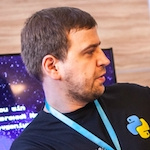 Microservices strike back!
Microservices strike back!
Oleg Churkin, Rambler & Co, Moscow
Oleg will tell you what requirements for the development process and the infrastructure of the project must be fulfilled in order to try micro (services) relatively quickly, efficiently and completely painlessly. He will talk about the problems that the pitonist will have to face when using microservices in production. Find out how to choose the right framework or utilitarian library for a specific type of task. He will tell you how to ensure fault tolerance and correctly respond to errors from third-party integrations.
 PyWat. Do you know Python well?
PyWat. Do you know Python well?
Alexander Shvets, Marilyn System, Moscow
We can spend hours building holivars and easily explaining to everyone what Python is better than any other language on the planet. But do we really know the basics of our favorite language? Alexander Shvets will conduct a quiz on knowledge of Python. The most advanced will surely receive prizes, the majority will discover something new about the interpreter of the language, and no one will remain indifferent.
 Children's diseases live chat
Children's diseases live chat
Olga Senemova, Tinkoff Bank, Moscow
Olga will talk about how a live chat is organized, what load it can withstand, the introduction of predictive responses to reduce the burden on operators, as well as how the chat is integrated into the bank's infrastructure.
 Amazing AppEngine
Amazing AppEngine
Alexander Hayorov, Ingram Micro (ex Parallels), Moscow
Alexander Hayorov will introduce one of the undeservedly little-known Google Cloud Platform services - Application Engine for Python. In addition to the traditional review of the service on the device and functionality, Alexander will describe a two-year experience of use, pros, cons and subtle points. After the report, you will know exactly how to place your projects in the cloud on the concept of PaaS.
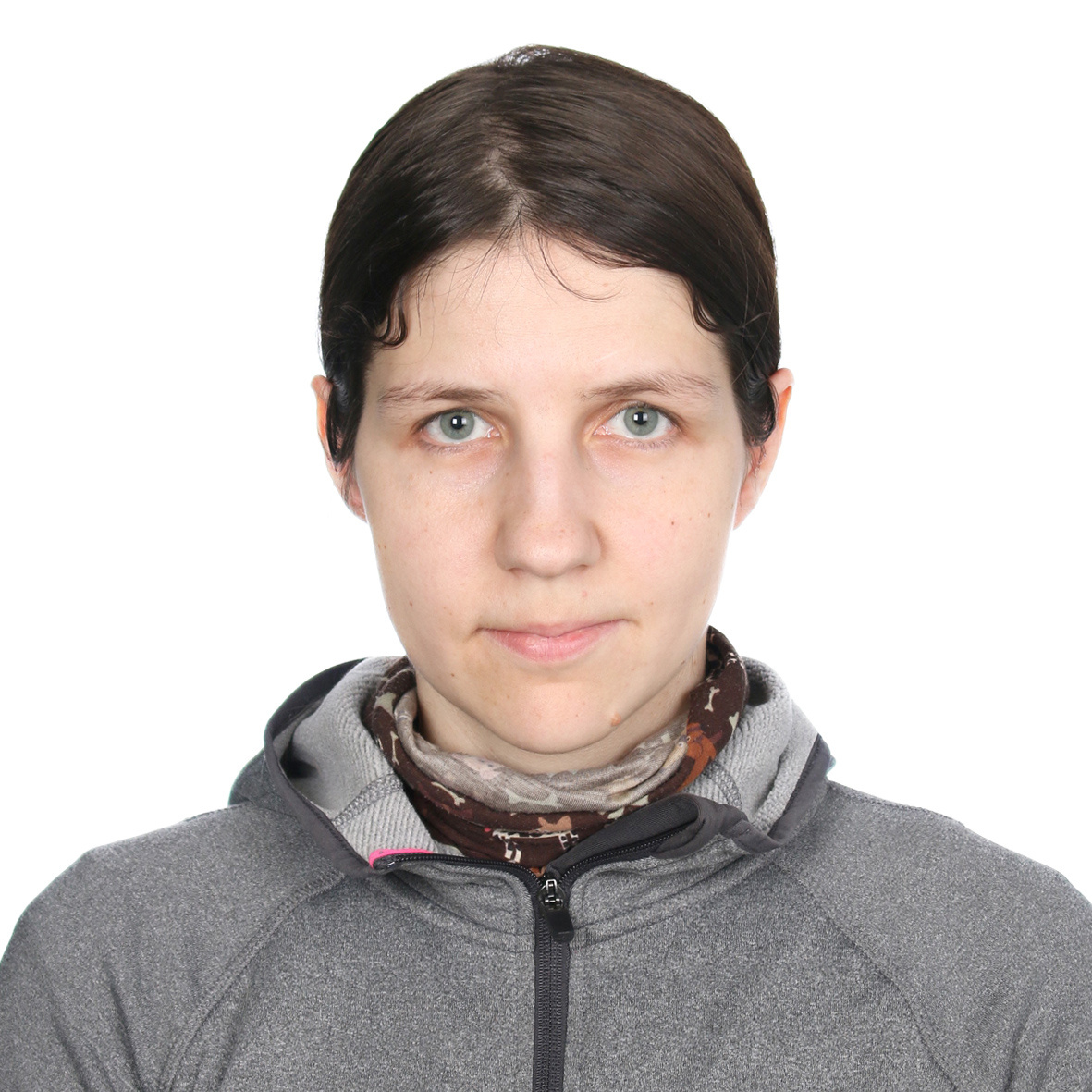 How I Learned to Stop Worrying and Love the BFG: Python Flavored Load Testing
How I Learned to Stop Worrying and Love the BFG: Python Flavored Load Testing
Nadezhda Mirgorodskaya, Yandex, St. Petersburg
Hope will tell you how they test the performance of services using Yandex.Tank and BFG, a load generator that supports test scripts written in Python. It will analyze in detail how BFG can be used to create load and other non-functional tests, how it allowed to easily integrate load testing into the general development cycle and why BFG in their teams became more popular than jMeter.
 What is a serverless architecture and how to live with it?
What is a serverless architecture and how to live with it?
Nikolay Markov, Aligned Research Group, Moscow
Why use the server explicitly if you can without them? In the modern world, we have the opportunity not to cut the cloud into separate machines, but to build entire pipelines and deploy applications without caring where and how they will be executed. Even the code can be written the absolute minimum, but in general you can hardly think about support and development. Sounds like science fiction? Understanding will be Nikolai Markov.
 How to write your debugger
How to write your debugger
Artyom Malyshev, independent developer, Nizhny Novgorod
Probably only a very talented programmer does not need debugging tools. To change the value of variables, to look step by step in the course of the program execution, it will be hard to sort everything out without Pdb. Artyom will talk about how these tools are designed, what internal Python VM mechanisms are involved and what platform limitations they suffer from.
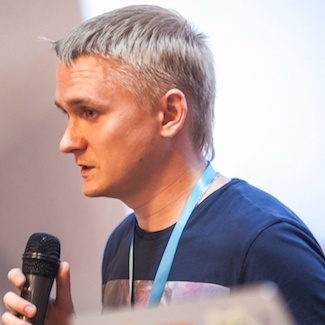 (No) dangerous python
(No) dangerous python
Ivan Tsyganov, Positive Technologies, St. Petersburg
This year, the Open Web Application Security Project (OWASP) has published the next TOP-10 of the most critical web application vulnerabilities. Ivan will tell you what this is for TOP-10 and what has changed in the last 4 years since the publication of the previous version. Explain what types of vulnerabilities are in the area of responsibility of the developer, and which they can not directly affect. It will show how popular frameworks help develop secure applications, and in what situations the framework will not be able to help.
 About analytics and silver bullets
About analytics and silver bullets
Alexander Podsoblyaev, Rambler & Co, Moscow
Alexander will tell you about how they restarted the Rambler / Top-100 tools available on the market and about their experience of moving from the architecture of batch data computation to real-time data computation. Talk about the architecture of the two solutions and their components. Briefly discuss the features of data processing using python in hive, the fundamental problems of storing aggregates, briefly review the advantages and disadvantages of the alternative approach.
 Gevent - to be or not to be?
Gevent - to be or not to be?
Alexander Mokrov, Positive Technologies, Nizhny Novgorod
Alexander will tell you what is under the hood of the gevent library and for what it may be useful. Leads architectural solutions for building asynchronous RPC based on gevent, and tells about the problems that can be encountered when using it.
 Gensim - thematic modeling for people
Gensim - thematic modeling for people
Ivan the Lesser, RaRe Technologies, Ekaterinburg
Ivan will tell about the fact that in general such thematic modeling (what “themes” are and how to extract them from a variety of texts) and how it can be applied to the data that we have (and not only). He will tell about the Gensim framework and demonstrate its capabilities.
 Memory and Python. What you need to know for happiness?
Memory and Python. What you need to know for happiness?
Alexey Kuzmin, CNS, Moscow
Alexey Kuzmin, a technical leader of the machine learning and data analysis group at TsNS, will tell you how the work with memory in Python is arranged and why your applications consume so much.
A few more reports will be added to the program. Full abstracts - on the conference website .

Python core developer, author and maintainer of many parts of the Raymond Hettinger language, spoke at PyConRu-2016 for the first time in Russia, this year Paul Hildebrandt, Łukasz Langa, Nina Zakharenko, Lynn Root, Maciej Fijałkkski
For students, we have a special fixed price - 9000 rubles. To buy a ticket at a special price, send a student scan to om@it-people.ru, in response we will send a promotional code.
Tell the students pythonists about this, suddenly, they do not know.

On the evening of July 16, we are waiting for all the participants on the after-party with a bonfire, beer, songs and tabletops.
Come to PyCon with your loved ones - they will also have something to do. The hotel has a swimming pool, fitness center, bowling alley, billiards, bicycle and roller rental, a spa and even a 5D cinema. The pool for conference participants will be free.
For children there is a playground, an amusement room and a trampoline.
A ticket for those traveling with you costs 6,000 rubles. It includes everything that a member's ticket, except for visiting reports.
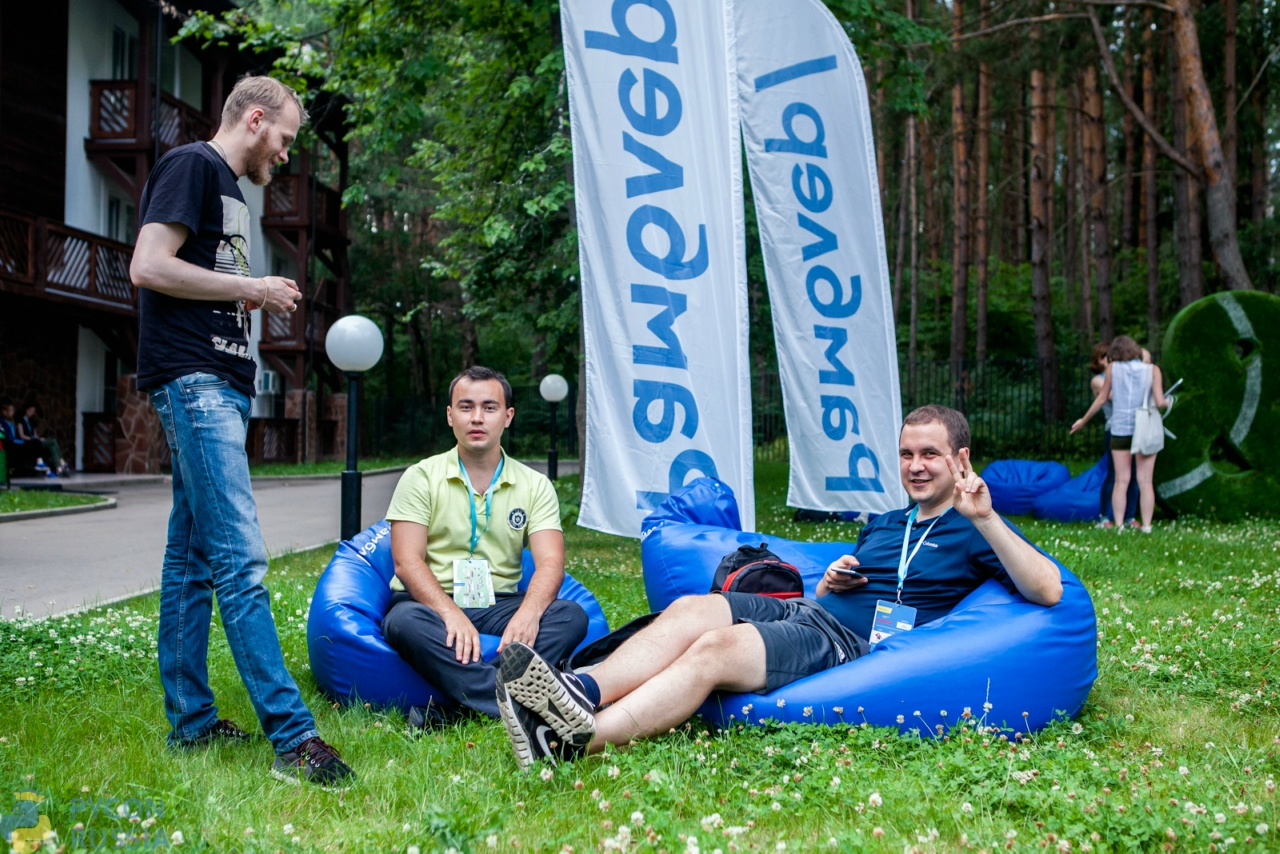
In more detail to learn what is in hotel, it is possible on the website "Yakhonty-Tarusa"
Until June 30, a ticket costs 15 500 rubles. Then the cost rises. The ticket price includes: participation in two days of the conference, accommodation in a double or triple room, meals, coffee breaks, participation in the afterparty, transfer from Moscow to the venue and back.
Registration and details on the conference website .

Join @PyconRu_bot bot, subscribe to our channel , to the Facebook page and you will be the first to hear news about the conference.
See you at PyConRu!
Thanks to our sponsor - Adcombo .
The program is now 25 reports. Here are some of the speakers: Paul Hildebrandt (Walt Disney Animation Studios, USA), Łukasz Langa (Facebook, USA), Nina Zakharenko (Venmo, USA), Lynn Root (Spotify, USA), Maciej Fijałkowski (PyPy, South Africa), Andrei Stepanov (Tinkoff Bank), Alexander Koshkin (Positive Technologies), Kirill Borisov (Yandex), Elizaveta Shashkova (JetBrains), Mikhail Yumatov (TsIAN), Igor Novikov (Scalr), Oleg Churkin (Rambler & Co).
Until June 30, a ticket costs 15 500 rubles. Then the cost rises. It's time to look at the program and register if you put it off. Under the cut in short all the reports of the conference.
')

Reports in English
 Inside the Hat: Python @ Walt Disney Animation Studios
Inside the Hat: Python @ Walt Disney Animation Studios Paul Hildebrandt, Walt Disney Animation Studios, Los Angeles, USA
The first headliner is a senior engineer at Walt Disney Animation Studios, Paul Hildebrandt. Paul leads the team responsible for developing a media asset management system, a media player, a review system of current film material with a mobile interface and other similar tools. Among the cartoons he worked on are “Cold Heart”, “Rapunzel”, “Ralph”, “City of Heroes”, “Volt” and others.
At the conference, Paul will talk about how Disney uses Python to create animated films.
 Gradual Typing of Production Applications
Gradual Typing of Production Applications Łukasz Langa, Facebook, California, USA
Python ore developer since 2010, Facebook developer, “chronic perfectionist, pianist, dad” Łukasz Langa will speak on “Gradual Typing of Production Applications”.
 Why is Python slow?
Why is Python slow? Maciej Fijałkowski, Baroque Software, South Africa, Cape Town
Maciej for the last few years has been working mainly on PyPy, participated in programming all parts of the code base, including JIT and GC. Also, Maciej is the main developer of jitviewer, a tool for analyzing the performance of python programs under PyPy. Maciej will give a talk “Why is Python slow?”
 Elegant Solutions for Everyday Python Problems
Elegant Solutions for Everyday Python Problems Nina Zakharenko, Venmo, Portland, USA
Developer at Venmo, earlier at Reddit and HBO, Nina Zakharenko will talk about common anti-patterns in python programs and show practical python solutions for improving your code with tools such as Decorators, Context Managers, Mixins and Lambdas.
 Tales of Tunes on Tubes: Python in Spotify's Infrastructure
Tales of Tunes on Tubes: Python in Spotify's Infrastructure Lynn Root, Spotify, USA, New York
The engineer in Spotify, a member of PSF and DSF, the leader of PyLadies, the founder and former leader of San Francisco PyLadies Lynn Root will tell how python is used in the main music streaming service in the world of Spotify, and how they move from 2.7 to 3.6.
Reports in Russian
 Master Class "Speech Recognition in Python without PhD"
Master Class "Speech Recognition in Python without PhD" Andrey Stepanov, Tinkoff Bank, Moscow
Developer Analyst Andrei Stepanov from Tinkoff Bank will talk at a master class on how to write and train your simple speech recognition engine with Tensorflow and neural networks as soon as possible.
 Python on the razor's edge: PyPy project
Python on the razor's edge: PyPy project Alexander Koshkin, Positive Technologies, St. Petersburg
The performance of the PyPy interpreter is achieved through specialization, as elsewhere. Alexander Koshkin, Senior Python developer at Positive Technologies, will tell you what exactly this means and how RPython allows you to build fast interpreters of arbitrary languages.
 Debugging in Python 3.6: Faster, Higher, Stronger
Debugging in Python 3.6: Faster, Higher, Stronger Elizaveta Shashkova, JetBrains, St. Petersburg
Elizabeth will tell you how the new interface for computing frames in Python 3.6 works, how it can help you create a quick debugger, and why such a quick debugger could not be created in previous versions of Python. For those who have not yet made the final decision about switching to Python 3.6, this report will provide several additional reasons why this is worth doing.
 Scrapy internals
Scrapy internals Alexander Sibiryakov, Scrapinghub, Czech Republic, Prague
Scrapy is a good example of a modern asynchronous application. Moreover, it combines in itself every functional: Item pipelines, HTML / CSS selectors, Middleware, support for several network protocols, stop / continue from the moment of stopping, and many others. Alexander will tell you how data processing looks from inside Scrapy, the architecture of the queue of the content loading module and other components necessary for its debugging: Scrapy shell, telnet console, memory consumption debugger.
 Python of Things
Python of Things Kirill Borisov, Yandex, Moscow
The permanent speaker of PyCon Russia, Kirill Borisov, will examine in the report the place of Python in the IoT world, how to use it in communication with various pieces of iron and on what it is launched for the sake of great justice.
Andrei Vlasov, JetBrains, St. Petersburg
In 2014, MicroPython appeared - a Python implementation for microcontrollers. How did you manage to get Python to work on something with only 16 kilobytes of memory? Did you have to cut the language hard for this? (spoiler: no!) What interesting things can be done with glands and MicroPython? Different sensors, accelerometers, LEDs, motors - that's all in the report of Andrew.
 Total performance control
Total performance control Mikhail Yumatov, TSIAN, Moscow
Mikhail will tell you what tools there are to monitor the performance of web applications. How to use them to collect detailed information on all operations, quickly detect problems and respond to them. Mikhail will also explain what statistical analysis is and how to use it for a detailed study of the performance of parts of the application.
Igor Novikov, Scalr, Kharkiv-Lviv
Although development in Python has shifted towards the server segment, desktop applications in Python are still relevant. Moreover, with an increase in processor performance, python-based applications have become an opportunity to reduce the financial, human and time costs of releasing desktop versions. And the most interesting point in this is the multiplatform nature of such applications. Igor Novikov will tell about a multiplatform python, toolkits and problems associated with them.
 Microservices strike back!
Microservices strike back! Oleg Churkin, Rambler & Co, Moscow
Oleg will tell you what requirements for the development process and the infrastructure of the project must be fulfilled in order to try micro (services) relatively quickly, efficiently and completely painlessly. He will talk about the problems that the pitonist will have to face when using microservices in production. Find out how to choose the right framework or utilitarian library for a specific type of task. He will tell you how to ensure fault tolerance and correctly respond to errors from third-party integrations.
 PyWat. Do you know Python well?
PyWat. Do you know Python well? Alexander Shvets, Marilyn System, Moscow
We can spend hours building holivars and easily explaining to everyone what Python is better than any other language on the planet. But do we really know the basics of our favorite language? Alexander Shvets will conduct a quiz on knowledge of Python. The most advanced will surely receive prizes, the majority will discover something new about the interpreter of the language, and no one will remain indifferent.
 Children's diseases live chat
Children's diseases live chat Olga Senemova, Tinkoff Bank, Moscow
Olga will talk about how a live chat is organized, what load it can withstand, the introduction of predictive responses to reduce the burden on operators, as well as how the chat is integrated into the bank's infrastructure.
 Amazing AppEngine
Amazing AppEngine Alexander Hayorov, Ingram Micro (ex Parallels), Moscow
Alexander Hayorov will introduce one of the undeservedly little-known Google Cloud Platform services - Application Engine for Python. In addition to the traditional review of the service on the device and functionality, Alexander will describe a two-year experience of use, pros, cons and subtle points. After the report, you will know exactly how to place your projects in the cloud on the concept of PaaS.
 How I Learned to Stop Worrying and Love the BFG: Python Flavored Load Testing
How I Learned to Stop Worrying and Love the BFG: Python Flavored Load Testing Nadezhda Mirgorodskaya, Yandex, St. Petersburg
Hope will tell you how they test the performance of services using Yandex.Tank and BFG, a load generator that supports test scripts written in Python. It will analyze in detail how BFG can be used to create load and other non-functional tests, how it allowed to easily integrate load testing into the general development cycle and why BFG in their teams became more popular than jMeter.
 What is a serverless architecture and how to live with it?
What is a serverless architecture and how to live with it? Nikolay Markov, Aligned Research Group, Moscow
Why use the server explicitly if you can without them? In the modern world, we have the opportunity not to cut the cloud into separate machines, but to build entire pipelines and deploy applications without caring where and how they will be executed. Even the code can be written the absolute minimum, but in general you can hardly think about support and development. Sounds like science fiction? Understanding will be Nikolai Markov.
 How to write your debugger
How to write your debugger Artyom Malyshev, independent developer, Nizhny Novgorod
Probably only a very talented programmer does not need debugging tools. To change the value of variables, to look step by step in the course of the program execution, it will be hard to sort everything out without Pdb. Artyom will talk about how these tools are designed, what internal Python VM mechanisms are involved and what platform limitations they suffer from.
 (No) dangerous python
(No) dangerous python Ivan Tsyganov, Positive Technologies, St. Petersburg
This year, the Open Web Application Security Project (OWASP) has published the next TOP-10 of the most critical web application vulnerabilities. Ivan will tell you what this is for TOP-10 and what has changed in the last 4 years since the publication of the previous version. Explain what types of vulnerabilities are in the area of responsibility of the developer, and which they can not directly affect. It will show how popular frameworks help develop secure applications, and in what situations the framework will not be able to help.
 About analytics and silver bullets
About analytics and silver bullets Alexander Podsoblyaev, Rambler & Co, Moscow
Alexander will tell you about how they restarted the Rambler / Top-100 tools available on the market and about their experience of moving from the architecture of batch data computation to real-time data computation. Talk about the architecture of the two solutions and their components. Briefly discuss the features of data processing using python in hive, the fundamental problems of storing aggregates, briefly review the advantages and disadvantages of the alternative approach.
 Gevent - to be or not to be?
Gevent - to be or not to be? Alexander Mokrov, Positive Technologies, Nizhny Novgorod
Alexander will tell you what is under the hood of the gevent library and for what it may be useful. Leads architectural solutions for building asynchronous RPC based on gevent, and tells about the problems that can be encountered when using it.
 Gensim - thematic modeling for people
Gensim - thematic modeling for people Ivan the Lesser, RaRe Technologies, Ekaterinburg
Ivan will tell about the fact that in general such thematic modeling (what “themes” are and how to extract them from a variety of texts) and how it can be applied to the data that we have (and not only). He will tell about the Gensim framework and demonstrate its capabilities.
 Memory and Python. What you need to know for happiness?
Memory and Python. What you need to know for happiness? Alexey Kuzmin, CNS, Moscow
Alexey Kuzmin, a technical leader of the machine learning and data analysis group at TsNS, will tell you how the work with memory in Python is arranged and why your applications consume so much.
A few more reports will be added to the program. Full abstracts - on the conference website .

Python core developer, author and maintainer of many parts of the Raymond Hettinger language, spoke at PyConRu-2016 for the first time in Russia, this year Paul Hildebrandt, Łukasz Langa, Nina Zakharenko, Lynn Root, Maciej Fijałkkski
Student discount
For students, we have a special fixed price - 9000 rubles. To buy a ticket at a special price, send a student scan to om@it-people.ru, in response we will send a promotional code.
Tell the students pythonists about this, suddenly, they do not know.

On the evening of July 16, we are waiting for all the participants on the after-party with a bonfire, beer, songs and tabletops.
+1 ticket
Come to PyCon with your loved ones - they will also have something to do. The hotel has a swimming pool, fitness center, bowling alley, billiards, bicycle and roller rental, a spa and even a 5D cinema. The pool for conference participants will be free.
For children there is a playground, an amusement room and a trampoline.
A ticket for those traveling with you costs 6,000 rubles. It includes everything that a member's ticket, except for visiting reports.

In more detail to learn what is in hotel, it is possible on the website "Yakhonty-Tarusa"
check in
Until June 30, a ticket costs 15 500 rubles. Then the cost rises. The ticket price includes: participation in two days of the conference, accommodation in a double or triple room, meals, coffee breaks, participation in the afterparty, transfer from Moscow to the venue and back.
Registration and details on the conference website .

Join @PyconRu_bot bot, subscribe to our channel , to the Facebook page and you will be the first to hear news about the conference.
See you at PyConRu!
Thanks to our sponsor - Adcombo .
Source: https://habr.com/ru/post/331336/
All Articles